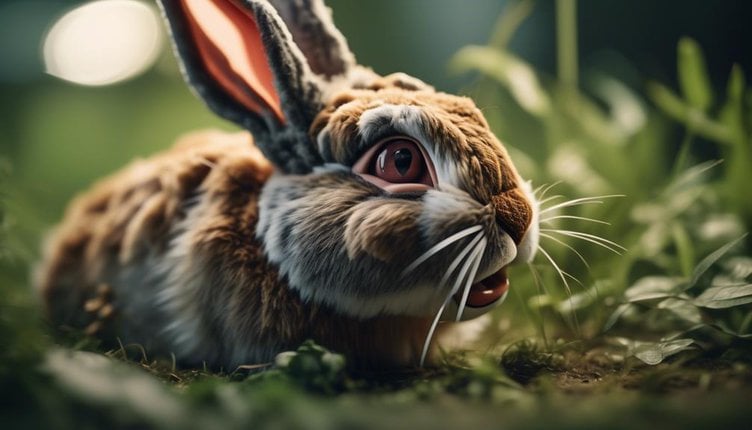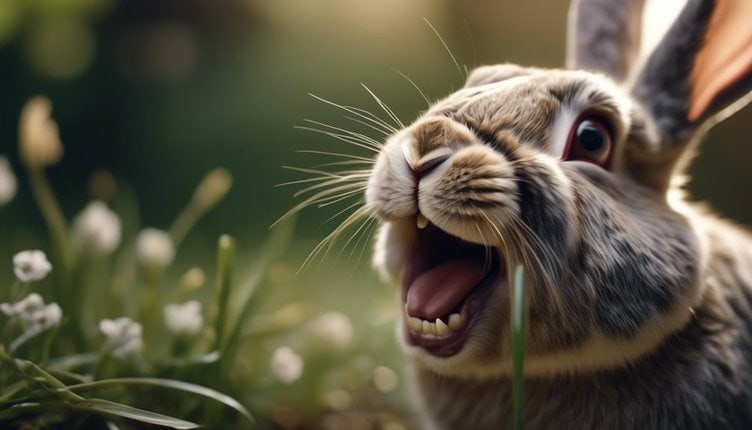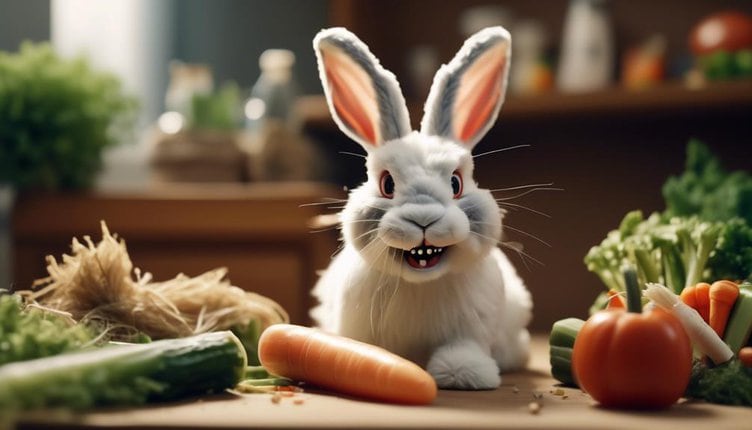When it comes to the dental health of rabbits, one simply cannot ignore the prevalent issue of malocclusion. This condition, often referred to as a misalignment of the teeth, can bring about a plethora of problems for these adorable creatures.
From the causes and risk factors to recognizing the symptoms, there is much to uncover about malocclusion in rabbits. By understanding the significance of regular dental exams, implementing proper dental care, and exploring prevention strategies, rabbit owners can ensure their cherished companions live a comfortable and healthy life.
But what exactly does malocclusion entail, and why is it crucial to address this issue promptly?
Key Takeaways
- Malocclusion in rabbits is a misalignment of the teeth that can affect both incisors and molars.
- Genetic factors, improper diet, and trauma can contribute to malocclusion in rabbits.
- Recognizing the symptoms of malocclusion, such as drooling, reduced appetite, and changes in behavior, is important for early detection.
- Prompt veterinary treatment, including filing or extraction of overgrown teeth, is crucial for preventing further complications and maintaining dental health in rabbits.
Understanding Malocclusion in Rabbits
Malocclusion in rabbits occurs when there's a misalignment of the teeth, leading to dental problems and potential complications. Understanding malocclusion in rabbits is crucial for rabbit owners and veterinary professionals to ensure the well-being of these animals.
Malocclusion can affect both the incisors and the molars of rabbits. The incisors, located in the front of the mouth, are responsible for cutting and nibbling on food, while the molars, located in the back, help grind food for digestion. When malocclusion occurs, it disrupts the normal alignment of the teeth, causing overgrowth, sharp edges, and even abscesses in the mouth.
There are several potential treatments for malocclusion in rabbits. The primary approach involves filing or trimming the teeth to restore proper alignment. This procedure should only be performed by a qualified veterinarian, as improper handling can cause further damage to the rabbit's delicate mouth.
In some cases, extraction of the affected teeth may be necessary to alleviate pain and prevent further complications. This procedure is typically done under anesthesia to ensure the comfort and safety of the rabbit.
Regular dental check-ups and a proper diet consisting of hay, fresh vegetables, and limited amounts of pellets can help prevent malocclusion in rabbits. Early detection and prompt treatment are essential for successfully managing this condition and ensuring the overall health and well-being of these furry friends.
Causes and Risk Factors
The development of malocclusion in rabbits can be influenced by various causes and risk factors, which play a significant role in the misalignment and subsequent dental problems experienced by these animals. Understanding these causes and risk factors can help in implementing effective prevention strategies to maintain optimal dental health in rabbits.
Causes:
- Genetic factors: Certain breeds of rabbits are more prone to developing malocclusion due to genetic predisposition.
- Diet: An improper diet lacking in fibrous materials, such as hay and grass, can lead to abnormal tooth growth and malocclusion.
- Trauma or injury: Accidents or injuries to the jaw or teeth can disrupt the alignment and proper growth of the teeth, resulting in malocclusion.
Prevention strategies:
- Balanced diet: Providing a diet rich in fibrous materials, such as hay and grass, helps promote proper wear and alignment of the teeth, reducing the risk of malocclusion.
- Regular dental check-ups: Routine dental examinations by a veterinarian can help identify any early signs of malocclusion and address them promptly.
- Genetic screening: Breeding programs should include genetic testing to identify and avoid mating rabbits with a higher risk of passing on malocclusion.
Recognizing the Symptoms

Recognizing the symptoms of dental issues in rabbits is crucial for early intervention and treatment. Common signs include:
- Drooling
- Reduced appetite
- Weight loss
- Changes in behavior such as increased aggression or lethargy
If any of these symptoms are observed, it's important to seek veterinary treatment promptly to prevent further complications and ensure the well-being of the rabbit.
Common Signs and Symptoms
Common signs and symptoms of dental issues in rabbits can include difficulty eating, drooling, and changes in appetite. It's crucial for rabbit owners to recognize these signs early on to ensure prompt dental health prevention and early intervention. Here are three common signs to watch out for:
- Difficulty eating: Rabbits with dental problems may struggle to chew or grind their food properly. They may take longer to finish their meals or show reluctance to eat altogether.
- Drooling: Excessive drooling or wetness around the mouth can indicate dental issues. This occurs when a rabbit's teeth are misaligned or overgrown, causing discomfort and hindering normal saliva flow.
- Changes in appetite: Rabbits with dental problems often experience a decrease in appetite. They may show disinterest in their usual food or have difficulty consuming certain types of food, such as hay or vegetables.
Seeking Veterinary Treatment
To ensure prompt intervention and proper dental care, it's essential for rabbit owners to be vigilant in recognizing the symptoms of dental issues and promptly seek veterinary treatment. When it comes to dental problems in rabbits, early detection and treatment are crucial to prevent further complications. Owners should be aware of signs such as drooling, decreased appetite, weight loss, and difficulty eating.
Once these symptoms are noticed, it's important to consult a veterinary specialist experienced in rabbit dentistry. These specialists have the knowledge and skills to accurately diagnose and treat dental issues in rabbits. Treatment options may include filing or extraction of overgrown teeth, pain management, and dietary modifications.
Seeking prompt veterinary treatment is vital in ensuring the well-being and dental health of rabbits.
The Importance of Regular Dental Exams
Regular dental exams are essential for maintaining the overall oral health of rabbits. Just like humans, rabbits can develop dental issues that can cause pain, discomfort, and even lead to serious health problems. Here are three reasons why regular dental exams are crucial for rabbits:
- Early detection of dental problems: Regular dental exams allow veterinarians to identify dental issues in their early stages. This includes detecting malocclusion, tooth root elongation, and other dental abnormalities. By catching these problems early on, veterinarians can provide timely treatment and prevent further complications.
- Prevention of dental diseases: Regular dental exams help prevent dental diseases in rabbits. By examining the teeth and gums, veterinarians can remove tartar buildup, which is a common cause of dental problems. Additionally, they can provide guidance on proper dental hygiene practices, such as tooth brushing and feeding a balanced diet, to maintain optimal oral health.
- Overall well-being and quality of life: Maintaining good dental health is crucial for a rabbit's overall well-being and quality of life. Dental issues can cause pain, difficulty eating, weight loss, and even infections. By ensuring regular dental exams, rabbit owners can help prevent these problems and ensure their furry friends lead a healthy and happy life.
Proper Dental Care for Rabbits

Proper dental care for rabbits involves:
- Brushing their teeth regularly: This helps prevent the buildup of plaque and tartar.
- Providing them with chew toys: Chew toys help wear down their teeth naturally.
- Scheduling regular veterinary check-ups: These check-ups are important for identifying any dental issues early on and ensuring overall oral health.
Brushing Rabbit's Teeth
When caring for a rabbit's dental health, it's essential to incorporate regular teeth brushing into their routine. Brushing the rabbit's teeth helps prevent dental problems and maintains good oral health.
Here are three important points to consider when brushing a rabbit's teeth:
- Use a rabbit-specific toothbrush: Rabbit toothbrushes have smaller heads and softer bristles, making them suitable for their delicate mouths.
- Use rabbit-friendly toothpaste: Avoid using human toothpaste, as it contains ingredients that are harmful to rabbits. Instead, use toothpaste specially formulated for rabbits, which is safe if ingested.
- Gradually introduce the toothbrush: Start by gently touching the rabbit's lips and gradually progress to brushing their teeth. Be patient and take it slow to make the experience positive for the rabbit.
Providing Chew Toys
To continue promoting optimal dental health for rabbits, incorporating chew toys into their routine is crucial. Chew toys not only provide mental stimulation and entertainment for rabbits but also help maintain their dental health. Rabbits have continuously growing teeth, and regular chewing helps wear down their teeth and prevent malocclusion. It is important to choose appropriate chew toys that are safe for rabbits to chew on. Some chew toy alternatives include untreated wooden blocks, apple branches, and cardboard tubes. These toys provide rabbits with a satisfying chewing experience while also promoting dental health. Additionally, dental health supplements such as vitamin C and calcium can be beneficial in maintaining strong and healthy teeth. Consulting with a veterinarian can help determine the best chew toy options and dental health supplements for individual rabbits.
| Chew Toy Alternatives | Dental Health Supplements |
|---|---|
| Untreated wooden blocks | Vitamin C |
| Apple branches | Calcium |
| Cardboard tubes |
Regular Veterinary Check-Ups
Regular veterinary check-ups are essential for maintaining proper dental care for rabbits. Rabbits have unique dental needs, and regular visits to the veterinarian help ensure their dental hygiene is in good condition and prevent dental problems. Here are three reasons why regular veterinary check-ups are crucial for rabbits:
- Early detection of dental issues: A veterinarian with experience in rabbit dentistry can identify dental problems such as malocclusion, abscesses, or tooth fractures at an early stage. This allows for prompt treatment and prevents further complications.
- Professional dental cleaning: During check-ups, a veterinarian can perform professional dental cleanings to remove tartar and plaque buildup, which can lead to dental problems if left untreated.
- Expert advice on dental care: Veterinarians can provide valuable guidance on preventing dental problems in rabbits, including proper diet, chew toys, and regular home dental care.
Prevention Strategies for Malocclusion

One effective method to prevent malocclusion in rabbits is by providing them with appropriate chewing opportunities. Chewing is a natural behavior for rabbits and plays a crucial role in maintaining their dental health. By offering a variety of chew toys and safe, fibrous materials such as hay, owners can help rabbits wear down their teeth and prevent malocclusion.
Regularly inspecting a rabbit's teeth is another important prevention strategy. Owners should watch out for signs of overgrowth, such as difficulty eating, drooling, or weight loss. If any abnormalities are noticed, it's essential to seek veterinary care promptly.
Proper nutrition is also vital in promoting dental health for rabbits. A balanced diet that includes an adequate amount of high-quality hay helps maintain proper tooth wear. Additionally, providing a variety of fresh vegetables can help promote jaw movement and strengthen teeth.
Maintaining a clean environment is crucial for preventing dental issues in rabbits. Dirty or damp living areas can increase the risk of dental disease. Regularly cleaning the rabbit's enclosure and providing fresh water daily can help prevent bacterial growth and maintain oral hygiene.
Seeking Veterinary Treatment and Care
Seeking veterinary treatment and care for rabbits is crucial in maintaining their dental health and preventing potential complications. Rabbits with malocclusion require specialized care from veterinary specialists who are experienced in treating dental issues in small animals. When seeking veterinary treatment for rabbits with malocclusion, there are several important considerations to keep in mind:
- Expertise: Look for a veterinarian who's experience in treating dental problems in rabbits. They should have a thorough understanding of rabbit dentistry and be skilled in diagnosing and treating malocclusion.
- Diagnostic tools: Veterinary specialists may use various diagnostic tools, such as oral examination, X-rays, and dental imaging, to accurately assess the extent of the malocclusion and identify any underlying dental problems.
- Alternative treatments: In some cases, alternative treatments may be explored to manage malocclusion in rabbits. These can include tooth filing or trimming, dental extractions, and orthodontic appliances. Your veterinarian will determine the most suitable treatment options based on the severity of the malocclusion and the overall health of your rabbit.
Frequently Asked Questions
Can Malocclusion in Rabbits Be Prevented by Providing Them With Specific Types of Food or Toys?
Providing specific types of food or toys can help prevent malocclusion in rabbits. Regular dental care is important for rabbits to maintain their dental health and prevent dental issues like malocclusion.
Are There Any Specific Breeds of Rabbits That Are More Prone to Developing Malocclusion?
Some rabbit breeds may be more genetically prone to developing malocclusion, a dental condition where the teeth do not align properly. Genetic factors play a role in determining the likelihood of malocclusion.
How Can I Tell if My Rabbit Has Malocclusion or if It's Just a Normal Dental Issue?
Signs of malocclusion in rabbits include abnormal tooth wear, drooling, decreased appetite, and weight loss. To differentiate malocclusion from normal dental issues, a veterinarian should perform a thorough oral examination and potentially take X-rays.
Can Malocclusion in Rabbits Be Treated Without the Need for Dental Surgery?
Can malocclusion in rabbits be treated without surgery? There are alternative treatments and natural remedies available for managing malocclusion in rabbits. These options can help alleviate symptoms and improve dental health without the need for invasive procedures.
Are There Any Alternative Treatments or Home Remedies That Can Help Manage Malocclusion in Rabbits?
Alternative treatments and home remedies may help manage malocclusion in rabbits. However, it is important to note that these options should be used in conjunction with professional veterinary care to ensure the best outcome for the rabbit's dental health.





